
Gracillariidae is an important family of insects in the order Lepidoptera and the principal family of leaf miners that includes several economic, horticultural or recently invasive pest species such as the horse-chestnut leaf miner, Cameraria ohridella.

Nepticulidae is a family of very small moths with a worldwide distribution. They are characterised by eyecaps over the eyes. These pigmy moths or midget moths, as they are commonly known, include the smallest of all living moths, with a wingspan that can be as little as 3 mm in the case of the European pigmy sorrel moth, but more usually 3.5–10 mm. The wings of adult moths are narrow and lanceolate, sometimes with metallic markings, and with the venation very simplified compared to most other moths.

Macrosaccus robiniella is a moth of the family Gracillariidae.
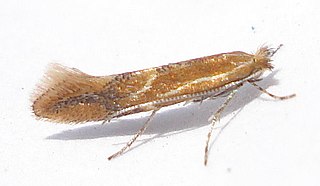
Phyllonorycter is a genus of moths in the family Gracillariidae.
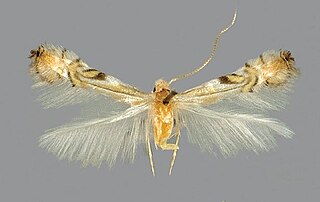
Phyllocnistis is a genus of moths in the family Gracillariidae.
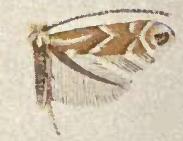
Phyllonorycter apicinigrella is a moth of the family Gracillariidae. It is found along the western coast of the United States from San Luis Obispo County, California, north to British Columbia, Canada.
Aspilapteryx tessellata is a moth of the family Gracillariidae. It is known from New South Wales, Australia. It has been recommended that this species be further studied as its placement within the genus Aspilapteryx is in need of clarification.
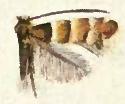
Chrysaster ostensackenella is a moth of the family Gracillariidae. It is known from Ontario, Québec and Nova Scotia in Canada, and the United States. It has also been recorded in 2015 from China and in 2017 from Korea, and in 2022 from Central Italy.
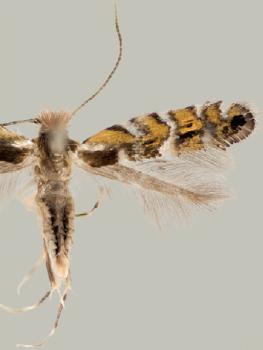
Macrosaccus morrisella is a moth of the family Gracillariidae. In North America it is known from Manitoba, Ontario, and Quebec, south and west to Texas and Colorado.
Caloptilia chalcodelta is a moth of the family Gracillariidae. It is endemic to New Zealand. The larvae of this species mine and fold leaves of species in the genus Nestegis.
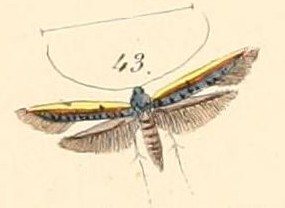
Caloptilia chrysitis is a moth of the family Gracillariidae. It is endemic to New Zealand. The larvae of this species mine and fold the leaves of species in the genera Weinmannia andElaeocarpus as well as Knightia excelsa, although only rarely for the later species.
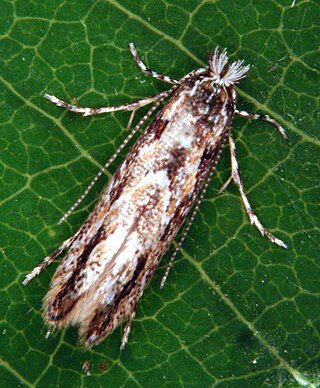
Lithocolletinae is a subfamily of insects in the moth family Gracillariidae. It is distributed worldwide, with most species in temperate regions.

Macrosaccus gliricidius is a moth of the family Gracillariidae. It is known from Central America and the West Indies.

Gracillariinae are a subfamily of moths which was described by Henry Tibbats Stainton in 1854.

Filatima pseudacaciella, the dusky-backed filatima moth, is a moth of the family Gelechiidae. It is found in North America, where it has been recorded from California, Illinois, Indiana, Kansas, Kentucky, Louisiana, Maine, Massachusetts, Mississippi, New Hampshire, New York, Ohio, Oklahoma, Ontario, Tennessee and West Virginia.
Macrosaccus coursetiae is a moth of the family Gracillariidae. It is known from Arizona in the United States.








